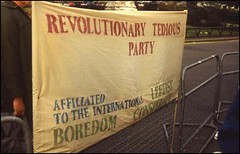I'm in Québec City right now, attending a 5-week intensive program in French Language immersion. One of the options I've chosen is an introductory survey course on Quebecoise literature. There are only a dozen students in the course, so the teacher said she'd like to run the class more as a seminar and less as a lecture. Which sounded great--but it turns out our teacher doesn't seem to know how to run a discussion (not an uncommon failing among teachers). She doesn't seem to grasp the first rule of student engagement--actually, the first of intellectual engagement in general. And that rule is this:
People engage with ideas on the basis of what they already know.

The technicalities of revolution are, as everyone who attended the party found out, pretty damn tedious.
(Revolutionary Tedious Party, originally uploaded by abitnice)
This rule has two important practical corollaries:
- Discussions turn on questions that everyone can answer. Domains where students are largely ignorant offer no footholds for students to establish a stance and launch into a discussion. If you start talking about what you know well, but what your students don't know at all, they won't respond for the simple reason that you're the obvious authority and what you say goes. If you base the discussion in a domain where the students have some knowledge (their own opinions are painfully dependable as a point of departure), you'll be able to introduce the topics you want to cover without killing the conversation.
- Technicalities kill engagement. Technicalities are inevitably the province of specialists. If you're talking about technicalities, you'd better be talking to another specialist (or someone who aspires to be a specialist). If you're not, guaranteed you're boring people in a way that makes them just want to break something.